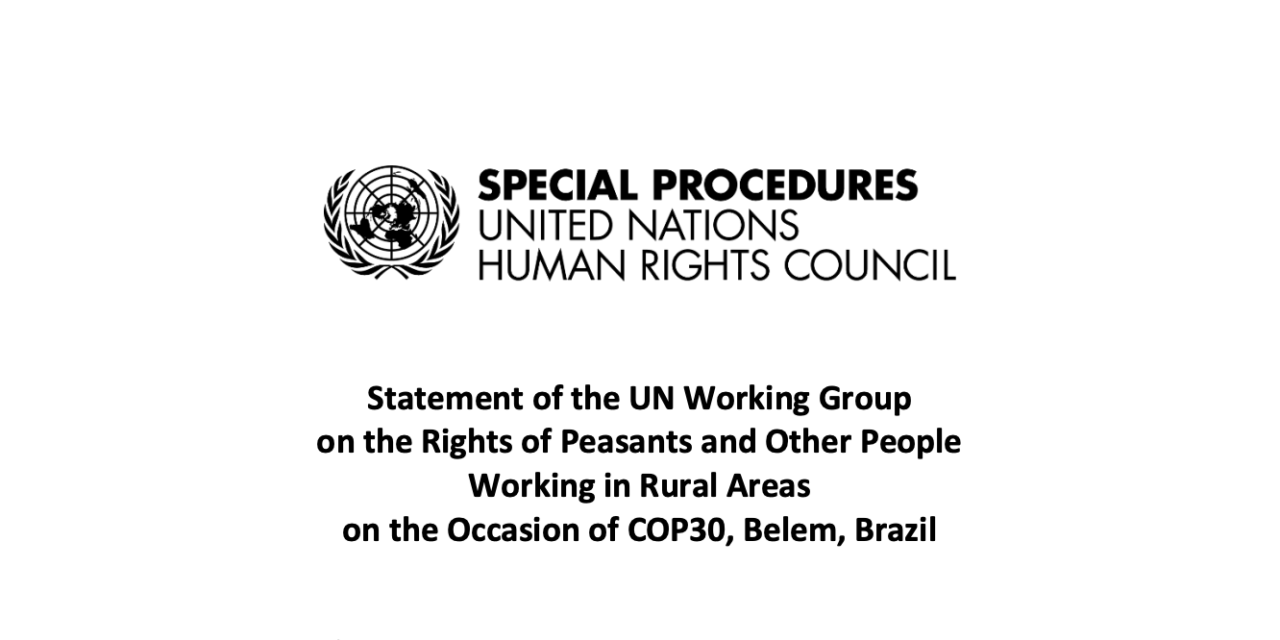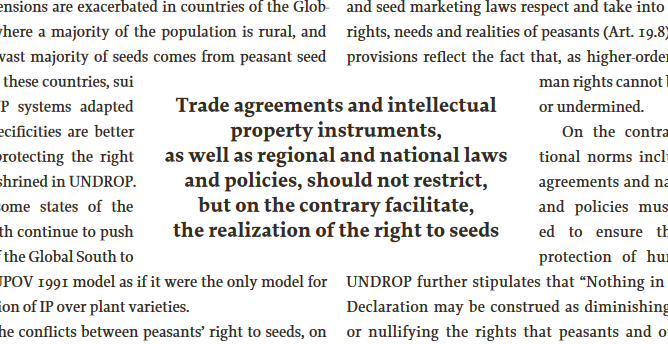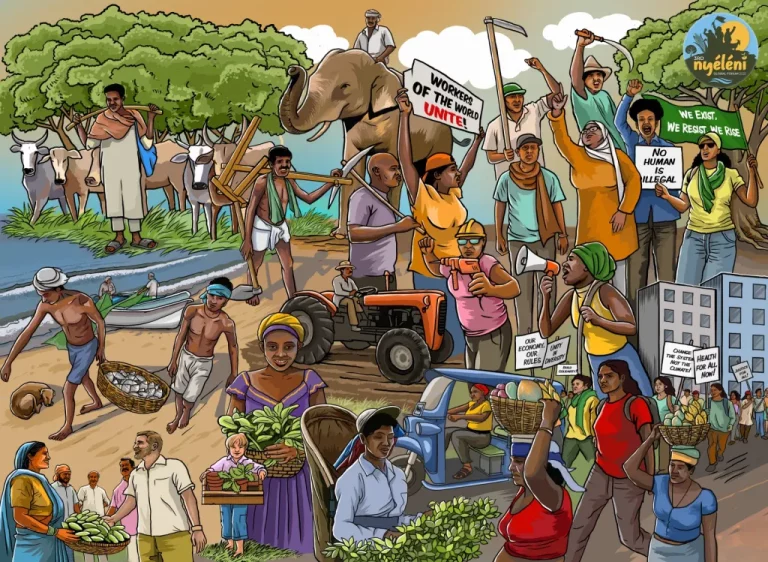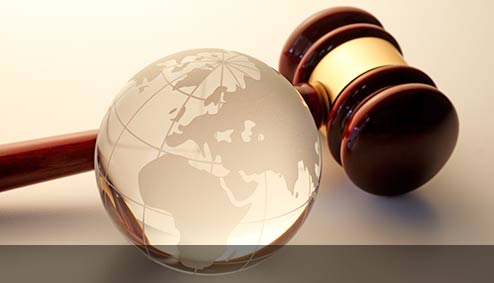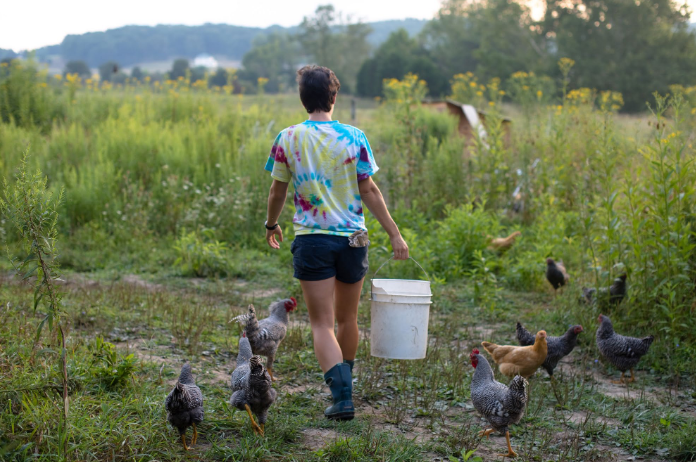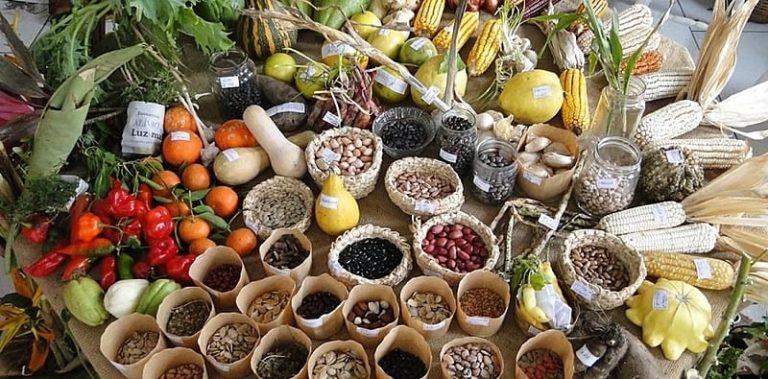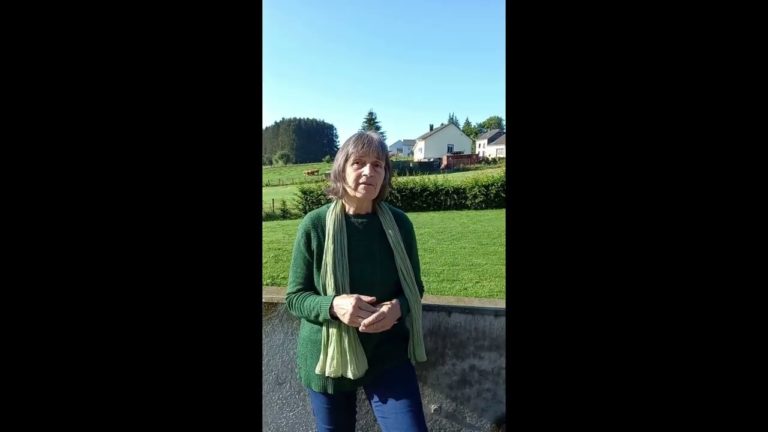Statement of the UN Working Group on the Rights of Peasants and Other People Working in Rural Areas on the Occasion of COP30, Belem, Brazil
Defending Peasants’ Rights hereby republishes the statement released by the UN Working Group on UNDROP on the occasion of COP30, taking place in Brazil from 10 to 21 November 2025 (also available here).
Geneva, 10 November 2025
Peasants and Rural Workers Rights at the Heart of Climate Justice
As world leaders and civil society gather for the 30th Conference of the Parties to the UN Framework Convention on Climate Change (COP30), the UN Working Group on the Rights of Peasants and Other People Working in Rural Areas1 calls for a clear change in global climate policy. Peasants, Indigenous peoples, fisherfolk, pastoralists and rural workers must no longer be seen only as victims of the climate crisis but as essential leaders in restoring ecosystems, feeding communities, and building social and economic justice.
Around 2 billion peasants, Indigenous peoples and producers grow more than 70 percent of the food eaten in low- and middle-income countries. They also protect much of the world’s biodiversity, keep traditional seeds and breeds alive, and maintain ecosystems and landscapes that sustain rural life and economies. Yet they receive less than one percent of global climate finance and are often excluded from key decisions about the future of food and climate. This imbalance must end.
1. Align Climate Action with Human Rights
The Paris Agreement and human rights aim to achieve the same goals. Governments cannot achieve real climate progress while ignoring their duty to protect the rights of those who feed the world.
States should include principles contained in the United Nations Declaration on the Rights of Peasants and Other People Working in Rural Areas (UNDROP)—especially the rights to land, seeds, water, biodiversity, and participation—in their national climate plans and adaptation strategies. Climate policies that overlook these rights risk increasing poverty, displacement, and hunger.
2. Direct Climate Finance to Peasant-Led Solutions
Most climate finance still supports large agribusinesses, export-oriented projects and market mechanisms that enable the causes and drivers of climate change, instead of supporting the capacities of those at the frontlines of impacts and innovative actions to tackle climate change. The Working Group calls for special funding channels within climate funds to directly support UNDROP’s rightsholders, including peasants, small-scale farmers, pastoralists, fishers, rural workers, Indigenous Peoples and rural women. These funds should provide grants, not loans, with simple rules and community-based oversight so that money reaches those who need it directly and in a timely fashion.
Special care must be taken not to doubly penalize the Global South by forcing States to take loans to cope with harms resulting from climate change that was predominantly driven by emissions from wealthy States. Financing for mitigation, adaptation, and loss and damage should be seen as a form of reparations by those who have benefited from the extractive operations that drive the climate crisis.
Investments should focus on agroecology, diverse farming, fishing and herding systems, soil, water and biodiversity regeneration, and other local methods that cut emissions and protect nature. Rural women peasants—who carry much of the work and responsibility for food security—need targeted support and recognition.
3. Share Technology Fairly and Respect Knowledge
For adaptation to be effective, technology must serve communities, not control them. Governments must uphold their UNDROP commitments by facilitating international cooperation leading to the sharing of science and technology, along with building local capacity.
States and organizations should promote open-source and community-owned tools. The right to save, share, and develop traditional seeds and breeds is central to food sovereignty and climate resilience. States should ensure that patent and trade laws do not criminalize traditional seed exchange nor encourage biopiracy. Indigenous and peasant knowledge, developed through generations, should be treated as a core part of climate innovation.
4. Protect Land, Water, and Biodiversity
Climate goals cannot be met while land grabbing, deforestation, destruction of riverine and marine ecosystems, and monoculture expansion continue. The Working Group urges secure land, resource and territory rights, comprehensive land and agrarian reform, and collective ownership and governance models that sustain both people and nature.
The market capture of life-sustaining natural landscapes and components through green and blue economies must be avoided and publicly called out when seen.
Governments must ensure that carbon-credit and conservation projects do not negatively affect rightsholders’ rights to land, seeds, or productive autonomy, nor affect their livelihoods. All projects must involve the participation of local rightsholders, and benefits must be shared with them.
5. Ensure a Just Transition for Rural People
The shift to sustainable food systems must protect the livelihoods of peasants and rural workers. All climate investments—public or private—must respect human rights obligations to prevent land, territory and biodiversity loss, labour abuse, and environmental harm.
Agribusinesses benefiting from climate funds must show compliance with international human rights obligations, particularly those in UNDROP. Peasants and other rightsholders, and their organisations, should have a real voice in national delegations and UNFCCC bodies that shape agricultural and adaptation policies.
6. The Way Forward
COP30 offers a rare chance to connect human-rights law and climate policy. The Working Group calls on States to:
- Ensure that all funds, mechanisms, proposals and solutions respect the individual and collective human rights of rightsholders as defined in UNDROP and other international human rights instruments.
- Reform all international and national climate and adaptation funds and facilities2 to allow direct access for UNDROP rightsholders, including peasants, farmers, fisherfolk, herders, Indigenous peoples, workers and rural women.
- Support rights-based technology cooperation, ensuring solutions emerge from prior consultations, informed consent and meaningful participation by rightsholders.
- Increase engagement among governments, peasant, fisherfolk and pastoralist movements, women’s groups, rural workers’ organisations, and Indigenous peoples to plan just transitions, informed by the rights in UNDROP.
“The climate crisis is inseparable from the crisis of rural injustice,” said the Working Group’s Chair. “Peasants and rural workers feed the world and cool the planet. Recognising and protecting their rights is not charity—it is the foundation of an effective, responsible and just response to climate change.”
ENDS
The experts:
The Working Group on Peasants and other people working in rural areas is comprised of five
independent experts from all regions of the world. The Chair-Rapporteur is Carlos Duarte
(Colombia), and the Vice-Chairs are Davit Hakobyan (Armenia) and Uche Ofodile (Nigeria); other
members are Shalmali Guttal (India), Geneviève Savigny (France).
Special Rapporteurs/Independent Experts/Working Groups are independent human rights
experts appointed by the United Nations Human Rights Council. Together, these experts are
referred to as the Special Procedures of the Human Rights Council. Special Procedures experts
work on a voluntary basis; they are not UN staff and do not receive a salary for their work. While
the UN Human Rights office acts as the secretariat for Special Procedures, the experts serve in
their individual capacity and are independent from any government or organization, including
OHCHR and the UN. Any views or opinions presented are solely those of the author and do not
necessarily represent those of the UN or OHCHR.
Country-specific observations and recommendations by the UN human rights mechanisms, including the special procedures, the treaty bodies and the Universal Periodic Review, can be found on the Universal Human Rights Index: https://uhri.ohchr.org/en/
For inquiries and media requests:
[email protected]
Media: Maya Derouaz ([email protected]), Dharisha Indraguptha ([email protected])
Follow: @UN_SPExperts
- La UNDROP y el Grupo de Trabajo se aplican a una gama muy amplia de personas, incluidas las
personas dedicadas a la agricultura artesanal o en pequeña escala, la plantación de cultivos, la ganadería, el pastoreo, la pesca, la silvicultura, la caza o la recolección, y la artesanía relacionada con la agricultura o una ocupación relacionada en una zona rural, junto con los pueblos indígenas, los pueblos nómadas y los migrantes, como se explica con más detalle en su artículo 1. ↩︎ - Incluyendo el Fondo Verde para el Clima de la CMNUCC, el Fondo de Adaptación del Protocolo de Kioto, los Servicios para el Medio Ambiente Mundial, los Fondos de Inversión Climática administrados por el Banco Mundial y los fondos nacionales de adaptación, entre otros. ↩︎

